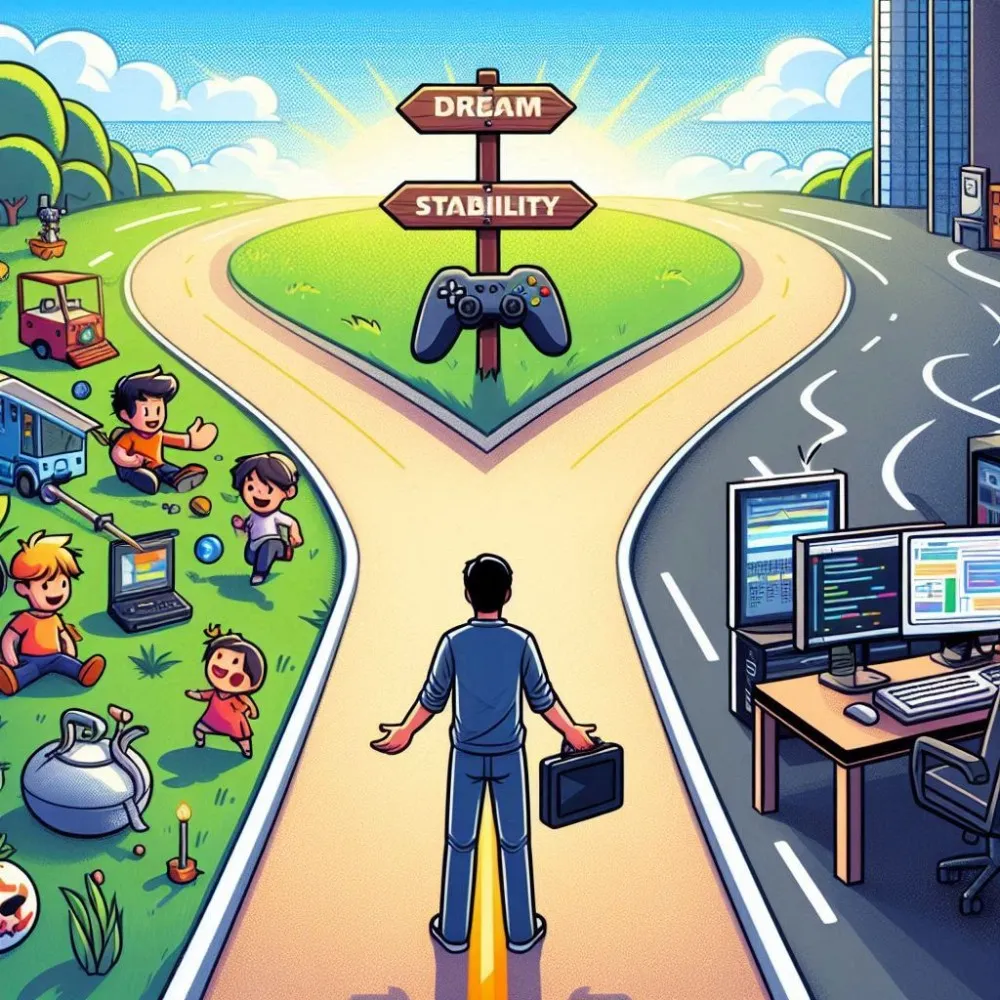The reality of tech careers: Balancing passion, competition, and opportunity

When I transitioned from coding to leading a development studio, I realized there was a story to tell about the tech world’s two sides. This article isn’t just about my journey but about every developer’s crossroads: do you chase the dream or settle for the steady path? Inspired by countless discussions in my professional circle, where misconceptions are debunked, I want to share these insights with everyone pondering a career in tech.
The Initial Dreams of Development
Many of us start loving tech because we love games or the cool world of computer security. For me, it began in high school. I taught myself to code with books and a few websites. I was super excited when I made a program that could turn off the computer without using the start menu. Gaming got me into coding; I wanted to make my own games or be a big name in game-making. Then, there was the fun side of computer security. I made some harmless “viruses”; like once, I sent a file to my friends on MSN that, when opened, would just send a message saying “Rudy is the best” on their screen. That was my fun way of learning about coding.
But here’s the truth: for every game that does well, there are thousands that no one really sees. Making games is really tough, with fewer spots than people who want them. Web development might not be as exciting at first, but that’s where most of the work is.

The Reality of the Job Market
The game development market is indeed saturated with talent, leading to fierce competition. This saturation is not just about the number of developers but also about the dreams and passions driving them into the industry, often willing to accept lower salaries for a chance to work on games. This has been echoed in various discussions where even seasoned developers acknowledge the difficulty in succeeding with new game projects due to the sheer volume of competition. On the other hand, the web development market, less competitive, doesn’t see the same level of overcrowding. Here, the demand for web developers remains high due to the continuous expansion of the internet’s role in business, e-commerce, and daily life. This demand often leads to better salary prospects because the competition for jobs isn’t as intense as in game development. The sentiment around web development doesn’t usually revolve around breaking into an oversaturated market but rather about keeping up with evolving technologies and frameworks, and mastering a larger skillset. This broader applicability of skills contrasts with game development, where knowledge in OpenGL coding or 3D geometry is harder to transfer outside the gaming industry. In the web industry, you’re usually part of a smaller team, putting you in direct contact with a wide range of skill sets. This exposure can open doors to new career paths. Working closely with end customers, for instance, can help you pick up sales skills, making it easier to transition to a sales role at your next company.

Web Development: The Rational Choice
So, why do many developers end up in web development? It’s not just about the money; it’s about stability. Here, you can code in peace, far from the crunch and with the occasional side project to keep the flame of passion alive. Web development might not have the same allure as creating the next big game, but it provides a steady canvas for your coding skills. And let’s be honest, loving what you do is crucial, not just loving the idea of doing it. You can’t be a hardcore gamer and expect to excel in game development; you have to love the grind of creating games.
The Developer’s Mindset
Being a developer is like playing with Lego bricks; it’s about the fun of putting data together in new ways. This way of thinking loves the excitement of messing around, where trying new things is the reward. Game development shows this feeling the most, needing a lot of passion and hard work. But, web development is easier to get into. It might not give the same rush as making games, but it has its own kind of fun with solving problems, even if they’re not as complex. It gives you both the joy of coding and the steadiness of a regular job path. Even though making websites isn’t the big adventure we thought of when we began coding, there’s deep joy in making ideas real that many can use. The true pull of coding is how it keeps you coming back with its mix of hard times and wins. We go through highs and lows, from feeling stuck when we can’t find answers, to those lightbulb moments when we feel brilliant. This up-and-down ride, moving from feeling down to feeling great, is what keeps coding, even web development, so interesting.
The Crossroads of Passion and Pragmatism
I speak from experience. Like many of you, I once imagined myself as a game developer. But as I pursued my career, I realized that my perception of the job was far from the reality. Much like the journey to becoming a CTO, people often have a skewed vision of what these roles entail. That’s why I wanted to share this reflection: to shed light on the complexities behind the dream and offer guidance to those navigating similar decisions.
However, this isn’t a story of compromise without hope. Many developers who start in web or software development use the skills and financial resources they gain to eventually chase their dream of creating a game. It may take years, but with patience and dedication, some do make the leap, turning their passion into reality. So, if you’re on that path, take heart, there are multiple ways to make the dream come true. Share your story too, because in doing so, we not only find camaraderie but also offer inspiration to those walking a similar road.

Rudy Baer
Founder and CTO of
BearStudio,
Co-founder of
Fork It! Community!
February 18, 2025
Mindset, Entrepreneurship, Devfront